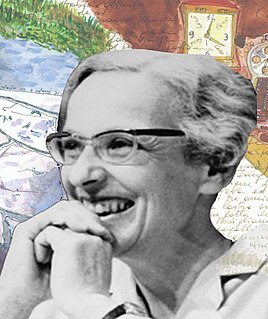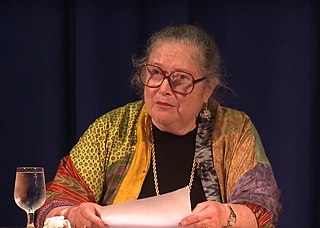A Quote by Susanne Katherina Langer
The power of understanding symbols, i.e. of regarding everything about a sense-datum as irrelevant except a certain form that it embodies, is the most characteristic mental trait of mankind. It issues in an unconscious, spontaneous process of abstraction, which goes on all the time in the human mind: a process of recognizing the concept in any configuration given to experience, and forming a conception accordingly. That is the real sense of Aristotle's definition of Man as "the rational animal".
Quote Topics
About
Abstraction
Accordingly
Animal
Any
Certain
Characteristic
Concept
Conception
Configuration
Definition
Embodies
Everything
Except
Experience
Form
Forming
Given
Goes
Goes On
Human
Human Mind
Irrelevant
Issues
Man
Mankind
Mental
Mind
Most
Power
Process
Rational
Real
Recognizing
Regarding
Sense
Spontaneous
Symbols
Time
Trait
Unconscious
Understanding
Which
Related Quotes
It is my mind, with its store of images, that gives the world colour and sound; and that supremely real and rational certainty which I call "experience" is, in its most simple form, an exceedingly complicated structure of mental images. Thus there is, in a certain sense, nothing that is directly experienced except the mind itself. Everything is mediated through the mind.
It is my mind, with its store of images, that gives the world color and sound; and that supremely real and rational certainty which I can "experience" is, in its most simple form, an exceedingly complicated structure of mental images. Thus there is, in a certain sense, nothing that is directly experienced except the mind itself. Everything is mediated through the mind, translated, filtered, allegorized, twisted, even falsified by it. We are . . . enveloped in a cloud of changing and endlessly shifting images.
Big ideas come from the unconscious. This is true in art, in science, and in advertising. But your unconscious has to be well informed, or your idea will be irrelevant. Stuff your conscious mind with information, then unhook your rational thought process. You can help this process by going for a long walk, or taking a hot bath, or drinking half a pint of claret. Suddenly, if the telephone line from your unconscious is open, a big idea wells up within you.
Since a rational man's ambition is unlimited, since his pursuit and achievement of values is a life-long process — and the higher the values, the harder the struggle — he needs a moment, an hour or some period of time in which he can experience the sense of his completed task, the sense of living in a universe where his values have been successfully achieved.
I have a hundred times heard him say, that all ages and nations have represented their gods as wicked, in a constantly increasing progression; that mankind have gone on adding trait after trait till they reached the most perfect conception of wickedness which the human mind could devise, and have called this God, and prostrated themselves before it.
If a psychological Maxwell devises a general theory of mind, he may make it possible for a psychological Einstein to follow with a theory that the mental and the physical are really the same. But this could happen only at the end of a process which began with the recognition that the mental is something completely different from the physical world as we have come to know it through a certain highly successful form of detached objective understanding. Only if the uniqueness of the mental is recognized will concepts and theories be devised especially for the purpose of understanding it.
The real world of American society is one which it is very misleading to call simply a democracy. Of course, it is in a sense a democracy, but it is one in which there are enormous inequities in the distribution of power and force. For example, the entire commercial and industrial system is in principle excluded from the democratic process, including everything that goes on within it
To sum up: numbers appear to represent both an attribute of matter and the unconscious foundation of our mental process. For this reason, number forms, according to Jung, that particular element that unites the realms of matter and psyche. It is "real" in a double sense, as an archetypal image and as a qualitative manifestation in the realm of outer-world experience.
As the Hindu gods are 'immortal' only in a very particular sense - for they had born and they die - they experience most of the great human dilemmas and often seem to differ from mortals in a few trivial details... and from demons even less. Yet they are regarded by the Hindus as a class of beigns by definition totally different from any other; they are symbols in a way that no human beign, however 'archetypal' his life story, can ever be. They are actors playing parts that are real only for us; they are masks behind which we see our own faces.
Man is a rational animal—so at least I have been told. … Aristotle, so far as I know, was the first man to proclaim explicitly that man is a rational animal. His reason for this view was … that some people can do sums. … It is in virtue of the intellect that man is a rational animal. The intellect is shown in various ways, but most emphatically by mastery of arithmetic. The Greek system of numerals was very bad, so that the multiplication table was quite difficult, and complicated calculations could only be made by very clever people.
It would be a mistake to believe that one could come to any substantive understanding of politics by discussing abstractly the good, the right, the true, or the rational in complete abstraction from the way in which these items figure in the motivationally active parts of the human psyche, and particularly in abstraction from the way in which they impinge, even if indirectly, on human action.
In the development of the understanding of complex phenomena, the most powerful tool available to the human intellect is abstraction. Abstraction arises from the recognition of similarities between certain objects, situations, or processes in the real world and the decision to concentrate on these similarities and to ignore, for the time being, their differences.
Man cannot survive except through his mind. He comes on earth unarmed. His brain is his only weapon. Animals obtain food by force. man had no claws, no fangs, no horns, no great strength of muscle. He must plant his food or hunt it. To plant, he needs a process of thought. To hunt, he needs weapons,and to make weapons - a process of thought. From this simplest necessity to the highest religious abstraction, from the wheel to the skyscraper, everything we are and we have comes from a single attribute of man -the function of his reasoning mind.







































